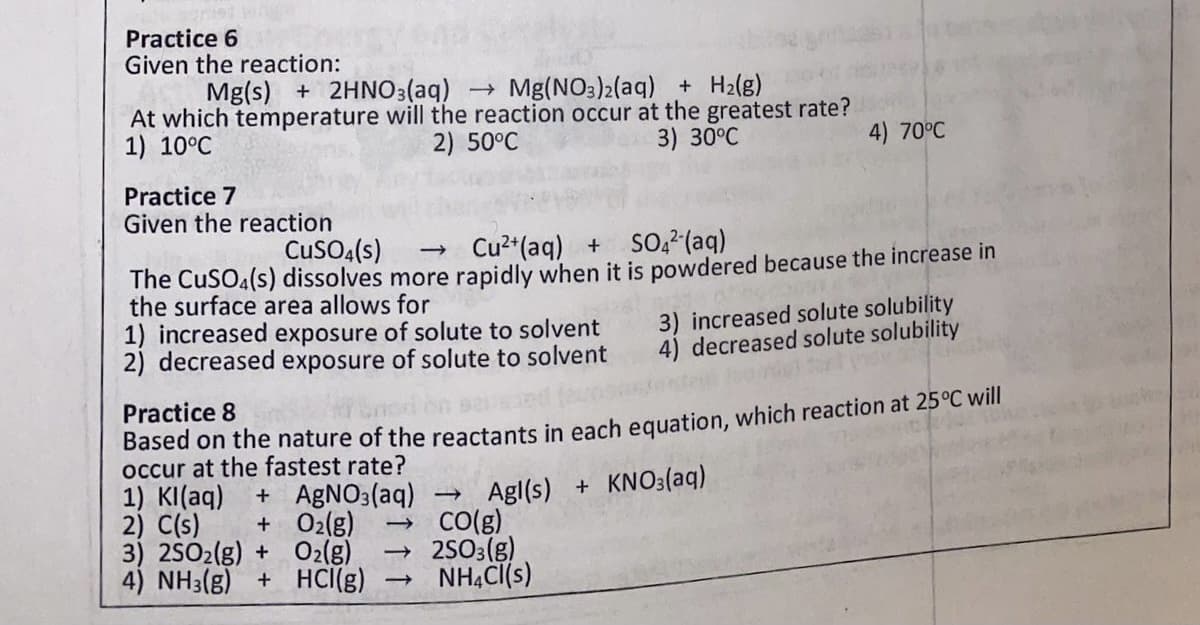Given the reaction: Mg(s) + 2HNO3(aq) Mg(NO3)2(aq) + H2(g) At which temperature will the reaction occur at the greatest rate? 2) 50°C 1) 10°C 3) 30°C 4) 70°C Practice 7 Given the reaction CuSO,(s) Cu²*(aq) + SO,2 (aq) The CuSO4(s) dissolves more rapidly when it is powdered because the increase in the surface area allows for 1) increased exposure of solute to solvent 2) decreased exposure of solute to solvent 3) increased solute solubility 4) decreased solute solubility Practice 8 Based on the nature of the reactants in each equation, which reaction at 25°C will occur at the fastest rate? + AgNO3(aq) + 02(g) Agl(s) + KNO3(aq) Co(g) 2SO3(g) NHẠC[(s) 1) KI(aq) 2) C(s) O2(8) 3) 2SO2(g) + O2(g) → 4) NH3(g) + HCl(g)
Given the reaction: Mg(s) + 2HNO3(aq) Mg(NO3)2(aq) + H2(g) At which temperature will the reaction occur at the greatest rate? 2) 50°C 1) 10°C 3) 30°C 4) 70°C Practice 7 Given the reaction CuSO,(s) Cu²*(aq) + SO,2 (aq) The CuSO4(s) dissolves more rapidly when it is powdered because the increase in the surface area allows for 1) increased exposure of solute to solvent 2) decreased exposure of solute to solvent 3) increased solute solubility 4) decreased solute solubility Practice 8 Based on the nature of the reactants in each equation, which reaction at 25°C will occur at the fastest rate? + AgNO3(aq) + 02(g) Agl(s) + KNO3(aq) Co(g) 2SO3(g) NHẠC[(s) 1) KI(aq) 2) C(s) O2(8) 3) 2SO2(g) + O2(g) → 4) NH3(g) + HCl(g)
Chemistry for Engineering Students
4th Edition
ISBN:9781337398909
Author:Lawrence S. Brown, Tom Holme
Publisher:Lawrence S. Brown, Tom Holme
Chapter11: Chemical Kinetics
Section: Chapter Questions
Problem 11.36PAE: The reaction NO(g) + O,(g) — NO,(g) + 0(g) plays a role in the formation of nitrogen dioxide in...
Related questions
Question
Hello, is it possible to answer all of them since they're multiple choice? Would really appreciate it. Thank you.

Transcribed Image Text:Practice 6
Given the reaction:
Mg(s) + 2HNO3(aq) Mg(NO3)2(aq) + H2(g)
At which temperature will the reaction occur at the greatest rate?
2) 50°C
1) 10°C
3) 30°C
4) 70°C
Practice 7
Given the reaction
CusO:(s)
Cu2 (aq) + SO,² (aq)
The CuSO4(s) dissolves more rapidly when it is powdered because the increase in
the surface area allows for
1) increased exposure of solute to solvent
2) decreased exposure of solute to solvent
3) increased solute solubility
4) decreased solute solubility
Practice 8
Based on the nature of the reactants in each equation, which reaction at 25°C will
occur at the fastest rate?
+ AGNO3(aq)
+ O2(g)
3) 2SO2(g) + O2(g)
4) NH3(g) + HCI(g)
1) KI(aq)
2) C(s)
Agl(s) + KNO3(aq)
Co()
2503(g)
NHẠC[(s)
Expert Solution
This question has been solved!
Explore an expertly crafted, step-by-step solution for a thorough understanding of key concepts.
This is a popular solution!
Trending now
This is a popular solution!
Step by step
Solved in 5 steps

Knowledge Booster
Learn more about
Need a deep-dive on the concept behind this application? Look no further. Learn more about this topic, chemistry and related others by exploring similar questions and additional content below.Recommended textbooks for you

Chemistry for Engineering Students
Chemistry
ISBN:
9781337398909
Author:
Lawrence S. Brown, Tom Holme
Publisher:
Cengage Learning

Introduction to General, Organic and Biochemistry
Chemistry
ISBN:
9781285869759
Author:
Frederick A. Bettelheim, William H. Brown, Mary K. Campbell, Shawn O. Farrell, Omar Torres
Publisher:
Cengage Learning

Chemistry: Matter and Change
Chemistry
ISBN:
9780078746376
Author:
Dinah Zike, Laurel Dingrando, Nicholas Hainen, Cheryl Wistrom
Publisher:
Glencoe/McGraw-Hill School Pub Co

Chemistry for Engineering Students
Chemistry
ISBN:
9781337398909
Author:
Lawrence S. Brown, Tom Holme
Publisher:
Cengage Learning

Introduction to General, Organic and Biochemistry
Chemistry
ISBN:
9781285869759
Author:
Frederick A. Bettelheim, William H. Brown, Mary K. Campbell, Shawn O. Farrell, Omar Torres
Publisher:
Cengage Learning

Chemistry: Matter and Change
Chemistry
ISBN:
9780078746376
Author:
Dinah Zike, Laurel Dingrando, Nicholas Hainen, Cheryl Wistrom
Publisher:
Glencoe/McGraw-Hill School Pub Co

Chemistry: Principles and Reactions
Chemistry
ISBN:
9781305079373
Author:
William L. Masterton, Cecile N. Hurley
Publisher:
Cengage Learning

Chemistry for Engineering Students
Chemistry
ISBN:
9781285199023
Author:
Lawrence S. Brown, Tom Holme
Publisher:
Cengage Learning

General Chemistry - Standalone book (MindTap Cour…
Chemistry
ISBN:
9781305580343
Author:
Steven D. Gammon, Ebbing, Darrell Ebbing, Steven D., Darrell; Gammon, Darrell Ebbing; Steven D. Gammon, Darrell D.; Gammon, Ebbing; Steven D. Gammon; Darrell
Publisher:
Cengage Learning